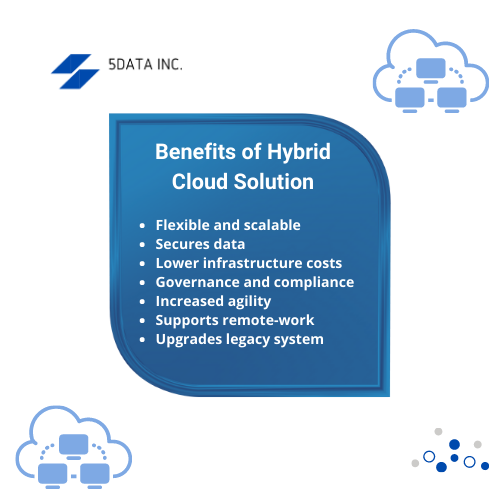The Hybrid Approach To Your Cloud Native Applications
Cloud infrastructure can be private or public. Private cloud architecture is in-house and offers high control and security for sensitive data. Public cloud architecture is off-site and accessed via the internet by third service providers such as Amazon Web Services, Google Cloud, and Microsoft Azure, making it ideal for streamlined workflows and collaborations. Still, it has a higher risk of vulnerability. Private clouds suit data-centric companies, while public clouds are ideal for ad-hoc software development projects.
A third option is a hybrid cloud, combining private or public clouds. It provides the efficiency of a public cloud and the security of a private cloud. However, managing multiple platforms and ensuring seamless API integration can be challenging and requires specialized skills for various cloud organizations.
A hybrid cloud is a lucrative choice because it embodies open and adaptable computing principles. By seamlessly integrating diverse platforms, it excels at driving business workloads in the most effective way possible. It allows organizations to leverage their investments while gaining new reach and agility through cloud-based services.
Benefits Of Creating A Successful Hybrid Cloud Solution
Broadcom advises business leaders that the best of all worlds, business success in today’s competitive landscape, depends upon the strength, efficiency, and agility of your cloud capabilities.
Hence, given its major advantages, a hybrid cloud has become popular for enterprises looking to optimize their existing infrastructure. The following are some key advantages of using a hybrid cloud for business applications.
Increased flexibility and scalability
- Enables organizations to scale resources up or down as per their needs.
- Allows businesses to leverage the benefits of cloud services while maintaining control over their sensitive information through modern computing.
Enhanced security and data protection
- It provides greater data control across on-premise data centers and security by enabling businesses to control their sensitive information.
- It offers great flexibility in managing data across multiple environments.
Reduced infrastructure costs
- Integrating disparate platforms allows organizations to reduce infrastructure costs, therefore leveraging the benefits of cloud technology.
- Offers greater efficiency and cost savings by enabling businesses to optimize their public cloud services.
Governance and compliance
- Cloud programmers can choose environments and solutions that best meet their data security needs while fulfilling compliance requirements for business-critical applications.
- It allows organizations to utilize less restrictive or non-compliance-based environments for their other needs.
Increased agility
- Cloud environments offer the benefit of scaling resources up or down as needed. The ideal hybrid cloud development company provides cloud computing services at optimal cost.
- These allow enterprises to meet changing business needs and workload demands without limitations or the need for infrastructure upgrades.
Remote-work supportive
- Hybrid cloud strategies allow systems to be accessed by employees from anywhere.
- It allows businesses to maintain work out-of-office and adapt to remote and hybrid work trends.
Enables legacy system upgrade
- Legacy applications can be maintained with a hybrid cloud strategy.
- Enterprises heavily relying on legacy systems can upgrade or rebuild their applications by utilizing hybrid cloud solutions.
- Organizations can leave legacy applications as they are or move them to the cloud model with a hybrid strategy.
As per the latest figures from Statista, a staggering 80% of global enterprises adopting a hybrid IT infrastructure in 2022 indicates a notable shift, reflecting the increasing popularity of hybrid cloud solutions as businesses prioritize scalable and flexible systems.

Tips For Choosing The Best Cloud Service Providers
The major technology investment lies in creating a strategy that meets your company’s needs and learning to select the best cloud-based service provider for your hybrid cloud strategy.
When selecting a hybrid cloud provider to integrate an organization’s on-premises systems with cloud-based ones, it is essential to consider several critical aspects. These aspects will impact the organization’s ability to manage its hybrid cloud environment effectively and maximize the benefits of a hybrid cloud approach.
- Cloud Integration Expertise: The selected provider must have demonstrated expertise in integrating on-premises systems with a cloud-native environment. They must have experience working with different cloud providers and deeply understand cloud security.
- Security and Compliance: Security is a critical aspect of any cloud environment. The provider must have a robust security framework to ensure the organization’s data is secure and compliant with industry regulations. They must provide detailed security and compliance reports and conduct regular security audits to ensure their systems remain secure.
- Providing Scalability and Flexibility: The hybrid cloud environment must be scalable and flexible enough to meet the organization’s current and future needs. The hybrid cloud development company must be able to scale up or down the infrastructure as per the organization’s requirements. They must also have flexible pricing models to accommodate the organization’s changing needs.
- Support and Service Level Agreements (SLAs): The provider must have a strong support team to resolve any issues quickly. The provider must also have Service Level Agreements (SLAs) to guarantee uptime, availability, and performance.
- Data Migration and Integration: The provider must have expertise in migrating data from on-premises systems to the cloud environment. They must also have experience integrating different applications and systems to manage data flow between different environments seamlessly.
- Performance and Latency: The provider must guarantee optimal performance and low latency for the organization’s applications and systems. The application development service provider must also have robust monitoring and analytics tools to quickly identify and resolve performance issues.
- Cost Optimization: Finally, the provider must have a cost optimization strategy to help the organization maximize its ROI. They must offer transparent pricing models and help the organization optimize its cloud usage to reduce costs.
Give Your Cloud A Silver Lining With 5Data Inc.
Cloud infrastructure can greatly benefit businesses, but choosing the right all-in-one cloud computing solution can be critical to success. Every business has unique needs and goals; the right cloud infrastructure can offer flexibility, scalability, security, and privacy.
If you seek professional cloud computing services to develop a cost-effective strategy, our hybrid cloud development company, 5Data Inc., can assist you. Our experts can help you plan and create the ideal open unified hybrid cloud solution to maximize your company’s performance.
At 5Data Inc., we offer robust cloud technology products to help businesses maximize their investments in hybrid cloud strategy. Our solutions enable businesses to maximize big data assets while replicating and safeguarding on-premise operations.

